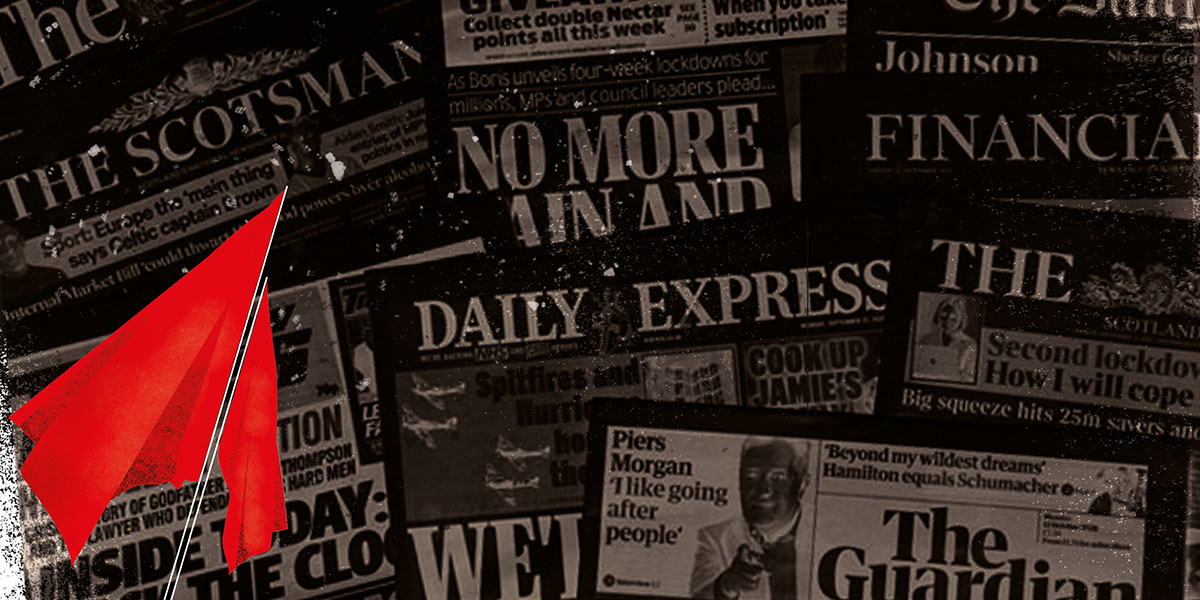Paula Lacey
When you got involved with Red Pepper in the 1990s, what did you hope for the alternative press?
Gary Younge
I was driven by this idea that the left was out of touch – not in terms of its policies but its interests. I wanted to bring in more of that place where the personal meets the political. I thought that the left could be more interesting than it tried to be. I still think there is a preponderance towards what is important as opposed to what is interesting. Hilary was always open to new ideas, so by 1996 I was doing a column called Tabloid Watch.
My thinking was, people who read Red Pepper don’t read the tabloids, but the tabloids shape a lot of political conversation. So, I’ll read the tabloids, and I will give our readers a sense of what’s shaping discussion on migration, or gay rights, or Labour.
Paula Lacey
In the years since, how has the landscape changed for outlets?
Gary Younge
Well, it’s much easier now because the economics of it have changed – you can build audiences globally and digitally. The digital creates space for what I think is a helpful fracturing, so that no one outlet has to do everything.
I was struck in rereading the 2004 article I wrote for the tenth anniversary that I was raving about blogs. There was no social media back then, which I think offers opportunities but also peril. In some ways, there’s more space for amplification, which also means more possibilities for the right. We’re no longer restricted to physical outlets but you’re competing in a much more cacophonous landscape.
Paula Lacey
How do you think Red Pepper has managed to survive where many others haven’t?
Gary Younge
I think an epitomising marker of its viability and relevance was what happened around Corbyn. Because Red Pepper had been tracking that possibility, it was documenting where that might have come from – covering the student protests, the response to 2008, even the uprisings against the World Trade Organisation. To read some of the mainstream columnists at the time, it was as if [Corbyn] had come out of nowhere, as an act of insanity, with no sense of something bigger.
Since then, it’s become more vital than ever. Where else will we see the distillation of the political from the electoral, be able to really talk through whether the Labour Party is fit for purpose? We’ve got a lot of thinking to do; we have to reimagine our interventions.
I thought that the left could be more interesting than it tried to be. I still think there is a preponderance towards what is important as opposed to what is interesting
Paula Lacey
Twenty years ago you wrote that ‘Financial restraint on freedom of speech has become a banal fact of life for the left.’ What are the challenges faced by left publications with little funding but a political commitment to paying marginalised and precarious writers?
Gary Younge
It’s tricky – there’s an extent to which producing Red Pepper is a political intervention, and I would no more expect to be paid for that than to be paid to go on a demonstration. But there’s also an extent to which it is work, and I do expect to be paid for work. I feel like on the left, as time has gone on, that distinction has not often been well observed, and we’ve seen a professionalisation of left-wing media interventions.
I think if it’s not a challenge, you’re probably not doing it right. Who has lots of money and wants to fund left-wing politics? To me, that would be an even greater paradox. It’s an organ that demands its independence, and that means being protective of its integrity.
Paula Lacey
Your tenth-anniversary article spoke of the role of the alternative press in challenging establishment media narratives during the Iraq war. Did revisiting it feel familiar given the current mainstream coverage of Palestine?
Gary Younge
There are certainly parallels. You had a mainstream media that set the framing so narrowly, while the public wanted more. The conversations that you were having in the world were not being replicated in the media, and Red Pepper provided an outlet for those conversations. People complain about preaching to the choir, but I think sometimes the choir needs a wider choice of songs.
There is a symmetry in this 30th anniversary of the magazine and its birth. Not only was 1994 the year of the Rwandan genocide, but it also saw Labour shift its moorings in pursuit of electoral gain. Now, in an entirely different context, the Labour leadership has chosen as its enemy a left that is marginalised in mainstream politics but not in society as a whole.
So the political project that Red Pepper sought to establish is as relevant to the situation now as it was back then. And its media relevance remains, because the outlets providing critical engagement – with what’s going on in Gaza, or with the strikes – are very limited given the huge numbers of people who want to see it.
Paula Lacey
You wrote that ‘Britain is a country where the left can produce the largest demonstration in the nation’s history and yet find that neither of the two main parties takes up its cause.’ Has anything changed?
Gary Younge
The 2023 British social attitudes survey describes the public as more left-wing than they’ve been at any time since 1986. We’re in this place where electoral politics are going one way as the public’s politics are going the other.
I don’t know how long that contradiction will go on. But this anniversary certainly feels significant because there are parallels between now and then – history doesn’t repeat itself, but sometimes it rhymes.










